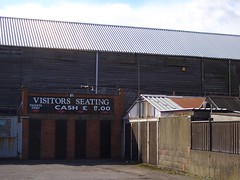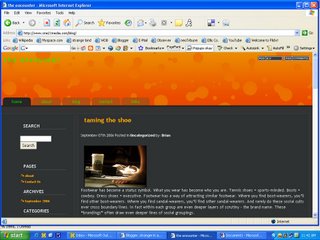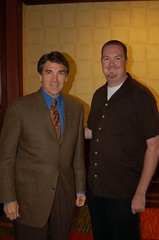Perry puts focus on growth, immigration
By JONATHAN BLUNDELL Daily Light staff writer
AUSTIN — With Labor Day, comes the unofficial start of the November campaign season and with four opponents vying for his residence at the governor’s mansion, Gov. Rick Perry doesn’t appear to be the least bit concerned.
In fact, with two write-in candidates in 2002, the field was just as broad.
Perry took home the win with 57.8 percent against Democrat Tony Sanchez (40 percent), as well as Libertarian Jeff Daiell (1.4 percent), Green Party candidate Rahul Mahajan (.7 percent) and write-ins Elaine Henderson (.04 percent) and Bill O’Neal (.02 percent).
While his 2006 opponents carry much more name recognition than his 2002 opponents, Perry’s war chest and polling numbers show a majority of the state is still behind the Republican governor.
As of the latest filings, Perry still leads the money race with $10.3 million in his campaign coffers.
Independent candidate Carole Strayhorn has $8.9 million awaiting her use, Democratic candidate Chris Bell has $654,500 to work with, Independent candidate Kinky Friedman has $491,000 and Libertarian candidate James Werner lags behind with $1,300.
Many political strategists believe that with five candidates running, 38 to 42 percent of the vote could win.
Perry still remains at the top of the polls, but his numbers have declined as his opponent’s name recognition increases — yet he is still the only candidate to remain above 30 percent in this year’s campaign polls.
The former state representative from West Texas, agricultural commissioner and lieutenant governor said he was surprised only four candidates were running against him.
“I was surprised there weren’t 10,” Perry said. “It’s a great job. In fact, according to the man who held it before me, it’s the greatest job in the world. My goal is to get more votes than the next closest person and win the election. I’m a results-oriented person, not a process-driven guy. There are plenty of people in the political world, consultants and media who like to spend a lot of time, ink and intellectual effort on the process stories. That’s fine but I only have so many hours to focus and work in a day and I’m real goal-oriented. So my goal is to win the election so I can continue to make a difference in people’s lives. How we do that, and what the score is, is for someone else to deal with. I cannot make a difference if I come in second.”
State growth
After being sworn in as governor on Dec. 21, 2000, Perry has served six years as the state’s highest elected official and with that experience, Perry believes the greatest issue facing Texas in the next four years is the state’s continued population growth.
“Without a doubt the greatest issue is the number of people we’re absorbing into the state — the population growth,” Perry said. “It’s a two-edged sword, people move to the state of Texas because there’s a great business climate, there’s a great opportunity for them to better their lives. Toyota thought it was a good enough business climate to invest $2 billion here. Samsung thought it was a good enough business climate to invest $3 billion in Austin. Texas Instruments thought it was a good enough business climate to invest in a $3 billion microchip plant. Obviously, that is an ever growing list and since June 2003 we’ve seen 630,000 net new jobs in the state. There’s a reason for that. We have a fair tax structure, balanced regulatory fund, fair legal system and we continue to invest in our public schools, in our public school teachers and in our children. Therefore, we have a skilled workforce. All those things collectively tell job creators that this is the state you want to be in. We’ve got one of the fastest job rates both percentage- and number-wise in the country. And it’s not because we have real pleasant weather in August.”
To deal with the population challenges Perry is calling for continued improvements to the state’s infrastructure.
“It is a multi-pronged view that you must have,” Perry said. “There’s dealing with transportation infrastructure — which is the reason why four years ago I laid out a plan to deal with the congestion, air pollution, safety issues and the Trans-Texas Corridor subsequently became statutorily the law of the land if you will. And now it’s being constructed.”
Perry touted the TTC as the first plan for the state’s transportation needs in the last 20 years.
“For 20 years there were people who looked at it and just scratched their heads and said, ‘Well, we’ll try to keep up and keep these roads open that we have,’ ” Perry said. “But there were no plans to create new infrastructure in the state. Economic growth as well as degradation of our environment and degradation of our citizen safety was about to become very pronounced in this state.”
Education funding
Along with transportation, Perry said there must also be continued improvements to the state’s education-based infrastructure.
“Obviously the building of infrastructure in higher education (will help),” Perry said. “We’ve got more kids going to college than we have ever before and you would think that was because we have an increase in the number of people into the state. But the fact is from 1999 to 2005 we’ve had a 21 percent increase in the number of kids to enroll in college while we only had a 10 percent increase in population.
“We’re really encouraging and helping students through student aid type programs. The accessibility and affordability of colleges is improving. I have delivered $1.8 billion for facilities with tuition revenue bonds for new facilities. What we did for K through 12 was extremely helpful as well. There are $1.3 billion in new dollars flowing into public schools and there will be $2 million new dollars in the out year. That is substantial money flowing into education. We also have a $2,000 across-the-board pay increase for teachers and a merit pay program that will allow some teachers up to $10,000 a year. It’s the largest merit pay program in America.”
While Perry touts the recent budget changes during this year’s special legislative session, his opponents are using the changes to attack him.
An e-mail was mailed this week to teachers across the area and state accusing Perry of forcing the Texas Retirement System to make drastic cuts in teacher pensions.
Perry said the e-mail was completely false and was nothing more than a political attack.
“We asked every agency in the state to come up with ideas to cut their budget,” Perry said. “That’s good public policy. It’s a good process to go through. I hope you do it in your life. From time to time you say, ‘I’m going to re-evaluate everything I do here. Do I really need NetFlix? Do I really need 186 channels? Do I really need to be driving this car? Do I really need to be making these expenditures in my life?’ And there are things that must be paid for. ‘I’ve got to pay my rent or mortgage’ or ‘I’ve got to pay the car payment.’ Some of those are a must. There are things out there, whether you’re in the state government or private sector that we’ve got to take a look at — and people do too.
“I’m sorry if I’m passionate about this, but it greatly disturbs me that a group who’s supposed to be looking after the best interest of the teachers would blatantly use a political statement 60 days before the election in an absolutely false way. As a matter of fact I would challenge them to send a letter to all their teachers and show them how I supported the Teacher Retirement System in 1999 and again in 2001 with funding increases — my bet is they probably don’t.”
Perry said if the TRS presents a budget seeking to cut teacher pensions he will ask his board members to find other ways to make cuts.
“I will ask my board members to take another look at it and see if there’s any place administratively or in some other way, form or fashion that they can make some reductions,” Perry said. “It’s not lost on me that state agencies play the political game too. ‘Oh, they want a 10 percent cut? Well, how do you like this, governor? Let’s cut the one thing that people are passionate about.’ I’ve been doing this for 22 years and didn’t fall off the pumpkin truck last night — at least not on my head anyways.”
TAKS
Perry also continues to support the TAKS test, while each of his opponents have come out against the current system.
“There’s nothing wrong with teaching to the test, it’s a curriculum,” Perry said. “The fact of the matter is that we are teaching a curriculum and then we are testing on the curriculum. When I was a kid in school, that was considered to be a standard practice and frankly we’ve gotten away from that. Now we are back to using a curriculum-based test to measure what our children know. And guess what, our children are performing at a higher level than they have historically. We are performing at a higher level nationally. As late as last week we even showed progress on SAT scores.”
According to the College Board, the state’s SAT scores stayed the same or were raised on both verbal and math areas from 2004 to 2005.
“My point is, I’m a defender of accountability,” Perry said. “I’m a defender of the TAKS test. As it is, it’s formulated to teach a curriculum and then to test that curriculum. My opponents, it appears, it’s sometimes hard to figure out what they’re for, they’re pretty good at saying what they’re against, my instinct and my gleaning through their ramblings is that they would be for going back to the old days of social promotion where you sure don’t want to make anybody feel bad about having to take a test or feel bad about not making the grade, so let’s pat them on their back and send them on to the next grade because we sure don’t want to make them feel bad. Then they step out in the real world and get slapped down by the reality of the real world. The real world does not, quite frankly, care how you feel. The real world is going to be a test and I want our children to be prepared for it rigorously. Not just be prepared but succeed in that highly competitive world.”
Perry sees the need for accountability because he believes students should be prepared for competing in the global community, not just a regional or district community.
“When I graduated from Pan Creek Rural High School in 1968, my competition was the 12 other people in my class,” Perry said. “By and large it was a very regionalized competition. When my son graduated from college this last May his competition was graduating the same day in Tokyo, Japan, Istanbul, Turkey, London, England, Beijing, China. Our children are in a global competition in a worldwide marketplace. And for us not to give them every tool to compete is to fail them — and it is a tough competitive world out there. I understand people’s concerns, but the fact of the matter is that no one has laid out a better concept to raise the bar for our children and be able to measure and diagnostically test. We have revolutionized over the past six years, in the state of Texas, the tools that are available to help kids perform at a higher level. And I’m proud of that.”
And while accusations abound of teachers only teaching students how to pass the test and not the curriculum itself, Perry said that policing of those teachers should come from their peers and their schools.
“I hope they’re teaching the curriculum. If they’re not, there’s a problem there,” Perry said. “And the local school needs to be addressing a teacher that is shortchanging those students. Quite frankly, by not teaching the curriculum and only teaching the test — I’ll be real honest with you - if we have teachers who are doing that, they ought to be brought up and that brought up is not a term that’s positive. There needs to be a little self-policing by the principal and the other teachers because they’re frankly hurting themselves and the reputation of the school by doing that.”
Immigration
As for illegal immigration issues in Texas, which has the largest Mexico/U.S. border, Perry said the federal government must first secure the border before moving on to other issues.
“You cannot have a legitimate, intellectual, constructive debate on immigration policy until you secure the border,” Perry said. “We’ve shown the federal government how to do that. We have invested substantial state dollars and used Department of Public Safety, Parks and Wildlife and all of our law enforcement assets in coordination with the law and the federal border patrol and our national guard in a way that’s been highly successful.
“It’s been identified by those border sheriffs - these are all Democrats, keep in mind, these are not people who share my political party - they have stood up and said this governor really gets it about securing the border. Operation Linebacker and Operation Rio Grande have been highly successful in reducing the amount of crime by upwards of 70 percent on some of the sectors of the border.”
Once the border is secure, Perry feels the real debate can begin.
“If the federal government is serious about securing our border and they will come to Texas and we’ll show them how to do it,” Perry said. “Then we can have an appropriate debate on immigration policy. Do we need a guest worker program? I happen to believe we do. Can you structure one that will address the work needs in Texas and the United States? Absolutely. Are we going to have an amnesty for these 11 million people? No, but we can have some type of alien resident program where these people are identified, they come out of the shadows, they pay taxes and they are given the ability to move between the two countries appropriately. But you cannot do that until you secure the borders.
“A fence or wall won’t work. You can’t even get a dam built in parts of Texas because of the environmental impact. Can you imagine a 1,200-mile wall? The environmentalists would go nuts. So there are probably some places in the highly urbanized areas along the border where fences help to control the illegal flow. But the fact of the matter is that a 1,200-mile obstruction of any type is unreasonable and unrealistic both in cost and time and reality.
“They’re passing legislation in California and Arizona to make it illegal to burrow under the border. I’m kind of like, ‘Duh. That’s going to stop them?’ Some of these laws get passed because they make people feel better but they have absolutely zero impact on reality. And they asked, ‘Don’t you have a problem with people burrowing under the border?’ I said by and large no, because it’s a long way because of the river.
You’ve got to burrow a long, long way.”
Standing by his record
With Election Day just more than 60 days away, Perry said his record will speak for itself.
“I’ve got a record that I’m very proud of and I want people to look at my record,” Perry said. “The other folks frankly don’t have much of a record and they really haven’t laid out many ideas about how they would improve the state of Texas.”
Pulling from President Ronald Reagan’s campaign, Perry said voters in Ellis County and Texas should ask themselves if they’re better off today than they were four years ago.
“Is the economy in Ellis County better today than it was four years ago? Are the decisions this governor made over the course of the last four years good and will four more years tend to make it better?” Perry asked. “And I would suggest to them yes. Whether it’s on transportation, economic development, public schools, kids’ chances of opportunity, kids going to college - all of those are positive for the citizens of Ellis County.”























